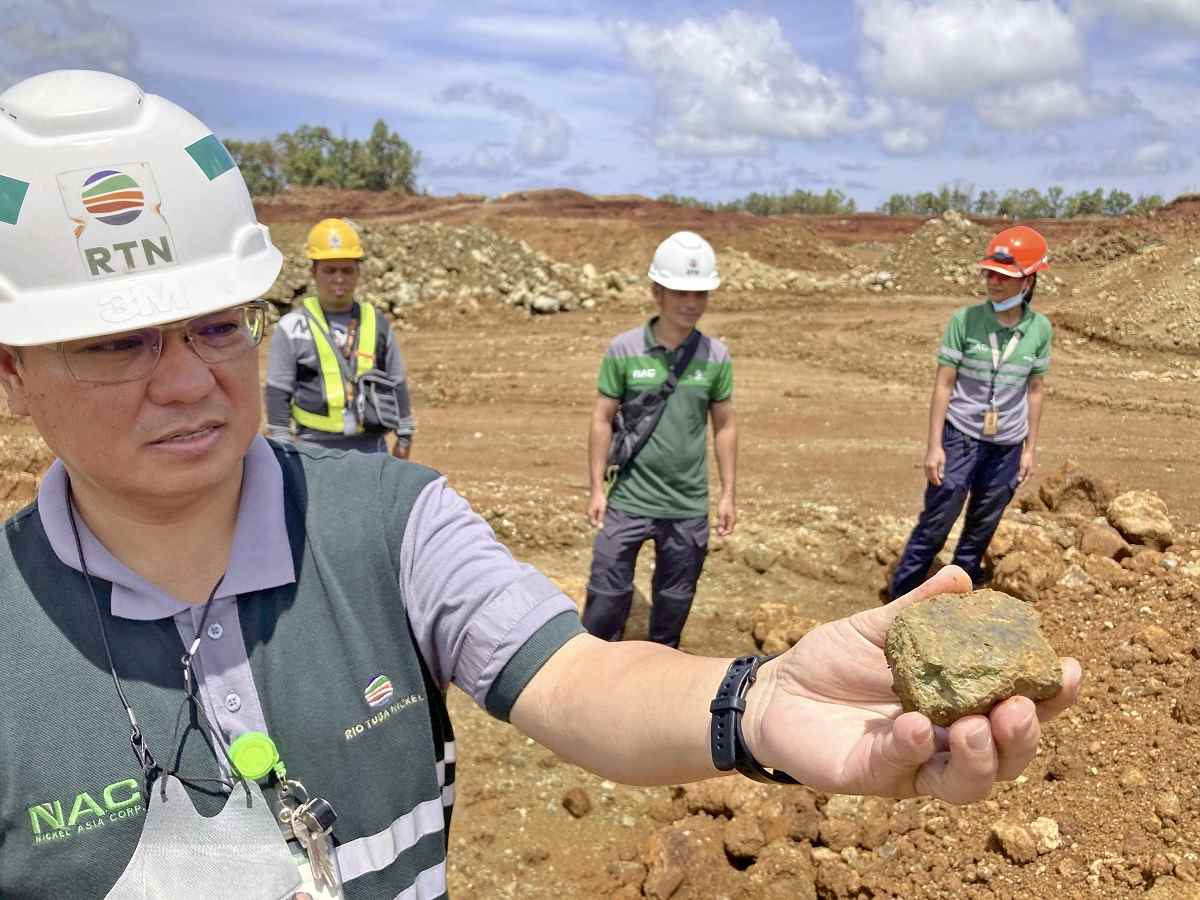- Political Series
- Future World Order
International Organizations / Resource Embargoes Go Unchecked amid WTO Dysfunction

A mining company official gives an explanation about nickel ore in June at the southern part of Palawan Island in the Philippines.
6:00 JST, July 22, 2023
This is the fifth and final installment of a series examining how international organizations are at a critical juncture due to changes in the global situation, such as Russia’s invasion of Ukraine.
***
The ground at the nickel mine in Rio Tuba on Palawan Island in the southwestern Philippines is covered in reddish-brown soil. Andre Mikael Dy of Nickel Asia Corp., the parent company of the local mine operating company, said with enthusiasm that demand for nickel production is increasing throughout the Philippines and that more mining areas will be developed and begin operations in the near future.
The Philippines ranks second in the world in nickel ore production. The nation has been receiving a tailwind from an export ban that was started in 2020 by Indonesia, the world’s largest nickel ore producer. The move increased the value of the Philippines as an alternative supply source of nickel.
Nickel is attracting attention as a material for lithium-ion batteries, mainly for use in electric vehicles.
Indonesia hopes to attract foreign investment by limiting the processing of its nickel ore to facilities inside the country, as a means to boost industrial development and economic growth. South Korea’s Hyundai Motor Co. has begun EV production in Indonesia.
The protectionist measure has generated opposition.
The European Union filed a complaint with the World Trade Organization, challenging the measure by claiming that it was unfair to EU steelmakers. The WTO’s dispute settlement panel, whose decisions are equivalent to rulings by a court of first instance, ruled in favor of the EU.
Indonesia then appealed to the Appellate Body, the final body to hear appeals from member countries in trade dispute settlements. But that body currently has no members due to opposition from the United States, and it has yet to start proceedings on the matter.
Indonesian President Joko Widodo maintains a confident stance, saying that even though his country faces a complaint filed with the WTO, it will never turn back.
As if sensing dysfunction in the WTO, Indonesia in June placed a ban on the export of bauxite, the main source of aluminum. Other emerging economies are also increasingly seeking to keep their resources to themselves.
After the end of the Cold War, the United States, emphasizing the importance of multilateral frameworks, promoted economic globalization under the WTO, the International Monetary Fund and other international organizations as the leader of the capitalist camp. In recent years, however, the United States has taken a more protectionist stance against the backdrop of its confrontation with China.
In April, at the WTO headquarters in Geneva, representatives of the United States and China engaged in a dispute at the Council for Trade in Goods, which discusses the import and export of goods.
According to a source, the Chinese side criticized the United States for abusing the concept of national security and endangering the rules-based multilateral trading system. The U.S. side dodged the issue, saying that the council was not an appropriate forum for discussing national security.
The struggle for technological hegemony between the United States and China has intensified with the added perspective of strengthening economic security. The United States has imposed an embargo on China in cutting-edge fields such as semiconductors. “The measure is borderline, almost violating the WTO agreement,” a Japanese government source said.
Similarly, in July, China decided to restrict exports of semiconductor materials, including the rare metal gallium.
China has been repeatedly criticized for its “economic coercion” in restricting exports to and imports from countries with which it has disagreements, even though President Xi Jinping states that China adheres to the WTO-based multilateral trading system and thus firmly opposes unilateralism and protectionism.
Top Articles in Politics
-

Japan PM Takaichi’s Cabinet Resigns en Masse
-

Sanae Takaichi Elected Prime Minister of Japan; Keeps All Cabinet Appointees from Previous Term
-

Japan’s Govt to Submit Road Map for Growth Strategy in March, PM Takaichi to Announce in Upcoming Policy Speech
-

LDP Wins Historic Landslide Victory
-

LDP Wins Landslide Victory, Secures Single-party Majority; Ruling Coalition with JIP Poised to Secure Over 300 seats (UPDATE 1)
JN ACCESS RANKING
-

Japan PM Takaichi’s Cabinet Resigns en Masse
-

Japan Institute to Use Domestic Commercial Optical Lattice Clock to Set Japan Standard Time
-

Israeli Ambassador to Japan Speaks about Japan’s Role in the Reconstruction of Gaza
-

Man Infected with Measles Reportedly Dined at Restaurant in Tokyo Station
-

Videos Plagiarized, Reposted with False Subtitles Claiming ‘Ryukyu Belongs to China’; Anti-China False Information Also Posted in Japan






















